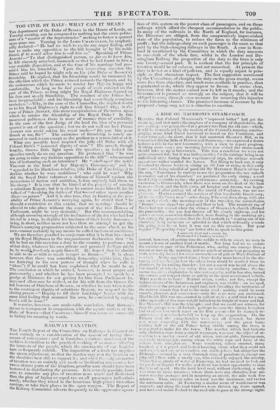TOO CIVIL BY HALF : WHAT CAN IT MEAN ?
"Tits deportment of the Duke of Sussnx in the House of Lords, on Tuesday evening, can be compared to nothing but the stern polite- ness of a "master of the dependencies" seeking to fasten a quarrel upon some one. Turning to the LORD CHANCELLOR, he emphati- cally declared—" He had no wish to excite any angry feeling, still less to make any opposition to the bill brought in by his noble friend, if he would allow him to call hint so." Speaking of Prince ALBERT—" To that distinguished person, us fit?' as he knew him, he felt sincerely attached, inasmuch as that he had found in him a very amiable disposition, and at the time of his marriage had pro- mised him his friendship. Upon that interesting Occasion the Prince said he hoped he might rely on his (the Duke of Sussex's) friendship. He replied, that his *lend:4111p would be measured by the affection which the Prince evinced towards the Queen, and by the endeavours which he made to render her Majesty happy and comfortable. As long as he had iwogis of such conduct on the part of the Prince, so long might his Royal Highness depend on his firm and steady friendship. The conduct of the Prince hail been irreproachable ; and his friendship had tweordtpgly remained unshaken."—Why, in the case of the Chancellor, the implied doubt as to his Royal Highness's right to call him friend? why, in the case of Prince AmilAIT, this stern recapitulation of the terms upon which he retains the friendship of the Royal Duke ? In this measured politeness there is more of menace than of cordiality. In the case of the first Judge of the land the idea of a personal quarrel is out of the question ; but we do not well see how Prince ALBERT can avoid asking his royal uncle--" Do you bite your thumb at me, Sir?" The existence of friendship is rarely an- nounced in such terms except as the preface to a renunciation of it. What can possibly have inspired the jolly old Duke with all Colonel Bath's " immortal dignity of man"? His speech, though lengthy, throws little light upon the question ; as locked his speeches rarely do on any question. He protested that " he was not going to raise any litctious opposition to the bill" : who accused him of harbouring such an intention ? Ile " ehallengml the noltle Viscount at the head of her Majesty's Government," and he " appealed to his illustrious relative, (the Duke of Calebridge,) to declare whether he were ambitious": who said lie was? Why did the Royal Duke volunteer a defence of himself against the accusations of faction and ambition, before anybody laid them to his charge? It is true that he hinted at. the proprietv of naming a substitute Regent ; but it is clear lie cannot menu himself, for he talked of "devolving the duties of that tsstered office upon another illustrious person." And it is also true, that in hinting at the pos- sibility of Prince ALBERT'S marrying again, he stated that " he thought a restriction to this extent, that no marriage should be allowed to take place without the consent of the two Houses of Parliament, might be very desirable." But this recommendation, although savouring strongly of the inclination of the fox who had lost his tail in a trap, to deprive his brethren of their bushy- honours— being, in short, neither more nor less than an attempt to get the Prince's marrying propensities subjected to the sane check as his own—cannot certainly by any means be called factious or ambitious. We arc therefore puzzled to conjecture what It is that has :eirred up his Royal Highness to the maimattimous declaration that " he felt he had on this occasion a duty to the country to perl'orm ; and ofthat duty, whatever his own private and personal ceilings might be, lie wouhifeariessty acquit himself. Ile hoped that should be able to do so with as much temper as firmness." It is clear, however, that there was something fermenting width] him, (he is too flattering to his own powers of thought when he calls it "ideas,") if he could but have explained what lie would be at. The conclusion at which he ardved, however, is most proper and praiseworthy; and whether he has been prompts.' to speak by a grudge at {Misters for not getting for him from Parliement the increased allowance he wished, or his wife front the Queen the full honours or Dotchess of SussEx, or whether he limy 'even aspire to the contingent dignity of substitute Regent, we respond to his closing prayer—" Hoping to till their Lordships' hearts with the same kind feeling that actuated his own, lie concluded by saying, God's will be done !" It contains, however, our unalterable conviction. that llottonI'e dream is transparent in comparison with the mystic oration of fit Duke of SUSSEX—that CROMWELL himself %US Dever So SIWCO,.,11.11 ID hiding his meaning by %VOA'S.


























 Previous page
Previous page